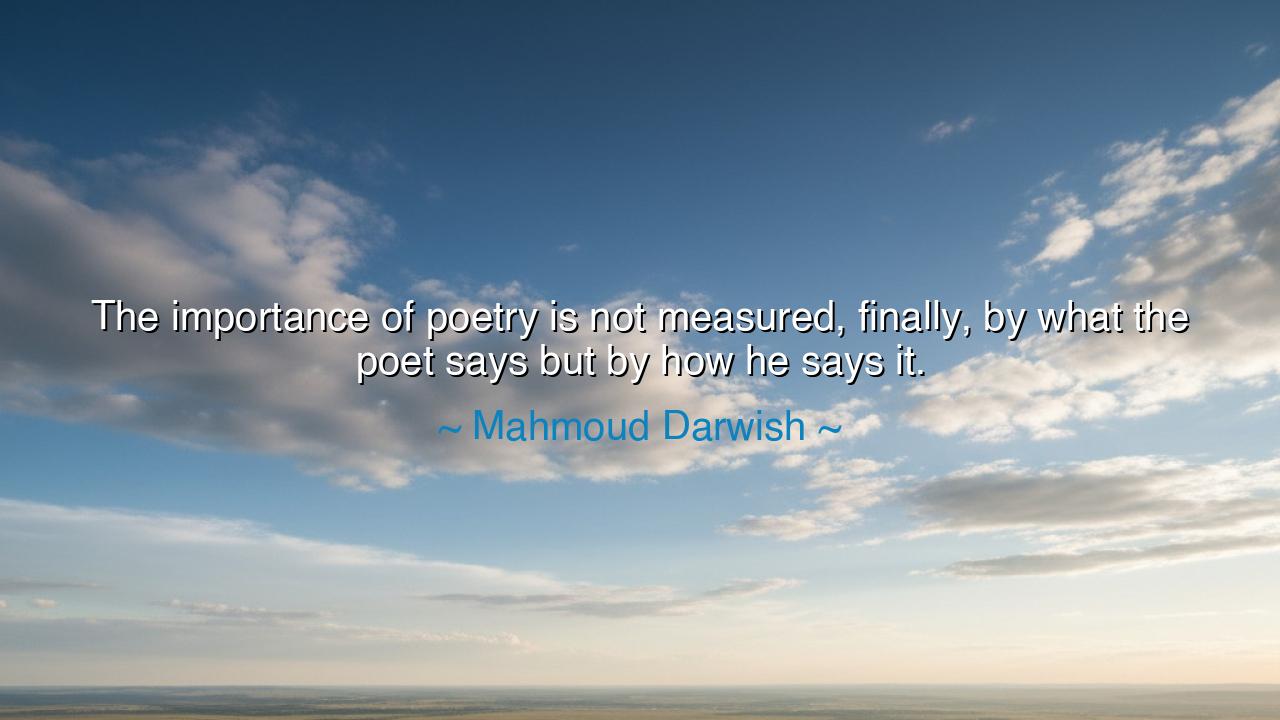
The importance of poetry is not measured, finally, by what the
The importance of poetry is not measured, finally, by what the poet says but by how he says it.






Hear the words of Mahmoud Darwish, poet of exile and voice of a scattered people: “The importance of poetry is not measured, finally, by what the poet says but by how he says it.” In this utterance, the secret of poetry is revealed. For it is not the bare fact, the cold message, or the skeleton of meaning that gives poetry its power—it is the flesh, the rhythm, the song of expression. What is said may be truth, but how it is said gives that truth wings, makes it soar into the hearts of men, and endure across generations.
The meaning of Darwish’s words lies in the distinction between message and music. Any man can state a truth plainly: “We are mortal. We are wounded. We long for love.” But when the poet takes these truths and shapes them with cadence, image, and fire, the words enter the soul as more than thought—they become experience. Thus the importance of poetry is not only in the content of speech, but in the form, the sound, the way it moves through the air and lingers in the heart. Poetry teaches us that how can be greater than what.
The ancients knew this well. Consider Homer, who sang of war and wrath, of Achilles and Hector. Many have told of battles, yet none with such enduring power. Why? Not because the facts of war were unknown, but because Homer clothed them in a voice that thundered like the sea, with rhythms that echoed in the memory of generations. The way he said it transformed his tales into immortal epics. Thus Darwish reminds us: the poet’s greatness is not merely in his subject, but in the artistry of his utterance.
History also bears witness in the words of Martin Luther King Jr. He spoke of justice, of equality, of freedom—ideas already known. But when he cried, “I have a dream,” it was not the idea alone that stirred a nation, but the poetry in his phrasing, the cadence of scripture, the music of hope woven into his speech. His words endure not simply because of their message, but because of the how—the way they were spoken, sung, and set aflame in the hearts of millions.
Darwish himself embodied this principle. As a poet of Palestine, he wrote of loss, exile, and yearning—subjects others also spoke of. But his words were woven with imagery that elevated grief into beauty, and longing into eternal flame. He showed that a people’s struggle could be carried not only in history books, but in the cadence of poetry, where sorrow becomes song. Thus his teaching is born of his life: the power of a poet lies not in mere proclamation, but in the shaping of words into living fire.
The lesson, then, is clear: do not think poetry is only about what you say. It is about the spirit you breathe into your words, the form that makes thought into art. The same truth, spoken plainly, may be forgotten tomorrow; but shaped with vision, it may endure for centuries. So too in life: it is not only what you do that matters, but how you do it. Honor, beauty, and clarity elevate even the simplest act.
Practical is this path: when you write, do not rush only to the message—give thought to its rhythm, its imagery, its soul. When you speak, let your words carry not only reason, but music. When you live, let your actions be more than mechanical—imbue them with grace, with meaning, with intention. For as Darwish teaches, the importance of poetry is not measured by what is said, but by how it is said—and in this wisdom lies the power to turn fleeting words into eternal song.






GHDoan Gia Han
This quote got me thinking about how poetry can stir emotions in a way that straightforward writing often cannot. When a poet’s choice of words, rhythm, and structure come together, they create a unique emotional impact. It’s like art—sometimes the meaning isn’t as important as the feeling it evokes. Can poetry, therefore, be a more profound way of communicating than other forms of writing, simply because it connects with us on a deeper, emotional level?
TV39 Le Nguyen Tuong Vy
I find this quote interesting because it challenges the conventional way of evaluating poetry. We usually focus on what is being said in a poem, but Darwish points out that it’s the 'how' that truly matters. Does this mean that form is more important than substance in poetry? Or does it suggest that the way something is said can unlock deeper meanings that aren’t immediately clear from the content alone?
PTPham Phuong Thuy
Darwish’s words resonate with me because they highlight the artistry of language. It’s easy to forget that poetry is a craft of expression as much as it is about content. What makes a poet’s work unforgettable is often how they weave their thoughts into language. Is it possible that a poem can say something profound without having a concrete message, simply because of how it makes us feel or think?
MDVo Minh Duc
This quote made me think about how poetry is often more about the experience of reading it than the content itself. The way a poet expresses emotions, ideas, or stories can resonate far deeper than the meaning of the words. How does the rhythm, structure, and tone of a poem shape our understanding? Is it the beauty of the language and the emotion behind it that makes poetry so powerful, rather than the literal message?